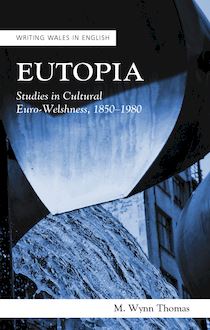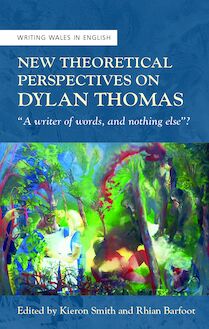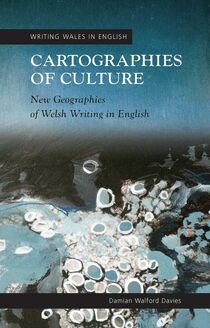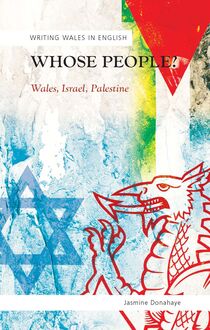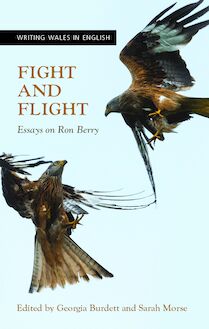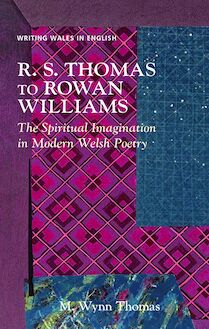Compatriots or Competitors? , livre ebook
189
pages
English
Ebooks
2022
Vous pourrez modifier la taille du texte de cet ouvrage
Obtenez un accès à la bibliothèque pour le consulter en ligne En savoir plus
Découvre YouScribe en t'inscrivant gratuitement
Découvre YouScribe en t'inscrivant gratuitement
189
pages
English
Ebooks
2022
Vous pourrez modifier la taille du texte de cet ouvrage
Obtenez un accès à la bibliothèque pour le consulter en ligne En savoir plus
Publié par
Date de parution
15 novembre 2022
Nombre de lectures
2
EAN13
9781786839367
Langue
English
This is the first comparative study of the distinctive literatures and cultures that have developed in Wales, Scotland, England and Northern Ireland since political devolution in the late 1990s, especially surrounding Brexit. The book argues that in conceptualising their cultures as ‘national’, each nation is caught up in a creative tension between emulating forms of cultural production found in the others to assert common aspirations, and downplaying those connections in order to forge a sense of cultural distinctiveness. The author explores the resulting dilemmas, with chapters analysing the growth of the creative industries; the relationship between UK City of Culture and its forerunner, the European Capital of Culture; national book prizes in Britain and Europe; British variations on Nordic Noir TV; and the Brexit novel. With regard to separate cultural precursors and responses in each nation, Brexit itself is debated as a factor that has widened their differences, placing the future of the UK in question.
List of Illustrations
Introduction: Compatriots or Competitors?
Chapter 1: From Counter Culture to Creative Industries
Chapter 2: The Cultural Capital of Capitals of Culture
Chapter 3: Imaging Northern Europe: British Varieties of Nordic Noir
Chapter 4: Aspiration by Proxy: National Book Awards in International Markets
Chapter 5: Brexit and Beyond
Afterword: Brexit and Coronavirus
References
Publié par
Date de parution
15 novembre 2022
Nombre de lectures
2
EAN13
9781786839367
Langue
English
C OMPATRIOTS OR C OMPETITORS?
WRITING WALES IN ENGLISH
CREW series of Critical and Scholarly Studies
General Editors: Kirsti Bohata and Daniel G. Williams ( CREW , Swansea University)
This CREW series is dedicated to Emyr Humphreys, a major figure in the literary culture of modern Wales, a founding patron of the Centre for Research into the English Literature and Language of Wales . Grateful thanks are due to the late Richard Dynevor for making this series possible.
Other titles in the series
Stephen Knight, A Hundred Years of Fiction (978-0-7083-1846-1)
Barbara Prys-Williams, Twentieth-Century Autobiography (978-0-7083-1891-1)
Kirsti Bohata, Postcolonialism Revisited (978-0-7083-1892-8)
Chris Wigginton, Modernism from the Margins (978-0-7083-1927-7)
Linden Peach, Contemporary Irish and Welsh Women’s Fiction (978-0-7083-1998-7)
Sarah Prescott, Eighteenth-Century Writing from Wales: Bards and Britons (978-0-7083-2053-2)
Hywel Dix, After Raymond Williams: Cultural Materialism and the Break-Up of Britain (978-0-7083-2153-9)
Matthew Jarvis, Welsh Environments in Contemporary Welsh Poetry (978-0-7083-2152-2)
Harri Garrod Roberts, Embodying Identity: Representations of the Body in Welsh Literature (978-0-7083-2169-0)
Diane Green, Emyr Humphreys: A Postcolonial Novelist (978-0-7083-2217-8)
M. Wynn Thomas, In the Shadow of the Pulpit: Literature and Nonconformist Wales (978-0-7083-2225-3)
Linden Peach, The Fiction of Emyr Humphreys: Contemporary Critical Perspectives (978-0-7083-2216-1)
Daniel Westover, R. S. Thomas: A Stylistic Biography (978-0-7083-2413-4)
Jasmine Donahaye, Whose People? Wales, Israel, Palestine (978-0-7083-2483-7)
Judy Kendall, Edward Thomas: The Origins of His Poetry (978-0-7083-2403-5)
Damian Walford Davies, Cartographies of Culture: New Geographies of Welsh Writing in English (978-0-7083-2476-9)
Daniel G. Williams, Black Skin, Blue Books: African Americans and Wales 1845–1945 (978-0-7083-1987-1)
Andrew Webb, Edward Thomas and World Literary Studies: Wales, Anglocentrism and English Literature (978-0-7083-2622-0)
Alyce von Rothkirch, J. O. Francis, realist drama and ethics: Culture, place and nation (978-1-7831-6070-9)
Rhian Barfoot, Liberating Dylan Thomas: Rescuing a Poet from Psycho-Sexual Servitude (978-1-7831-6184-3)
Daniel G. Williams, Wales Unchained: Literature, Politics and Identity in the American Century (978-1-7831-6212-3)
M. Wynn Thomas, The Nations of Wales 1890–1914 (978-1-78316-837-8)
Richard McLauchlan, Saturday’s Silence: R. S. Thomas and Paschal Reading (978-1-7831-6920-7)
Bethan M. Jenkins, Between Wales and England: Anglophone Welsh Writing of the Eighteenth Century (978-1-7868-3029-6)
M. Wynn Thomas, All that is Wales: The Collected Essays of M. Wynn Thomas (978-1-7868-3088-3)
Laura Wainwright, New Territories in Modernism: Anglophone Welsh Writing , 1930–1949 (978-1-7868-3217-7)
Siriol McAvoy, Locating Lynette Roberts: ‘Always Observant and Slightly Obscure’ (978-1-7868-3382-2)
Linden Peach, Pacifism, Peace and Modern Welsh Writing (978-1-7868-3402-7)
Kieron Smith, John Ormond’s Organic Mosaic (978-1-7868-3488-1)
Georgia Burdett and Sarah Morse (eds), Fight and Flight: Essays on Ron Berry (978-1-7868-3528-4)
M. Wynn Thomas, Eutopia: Studies in Cultural Euro-Welshness, 1850–1980 (978-1-78683-614-4)
Linden Peach, Animals, Animality and Controversy in Modern Welsh Literature and Culture (978-1-78683-937-4)
C OMPATRIOTS OR C OMPETITORS?
W ELSH, S COTTISH, E NGLISH AND N ORTHERN I RISH W RITING AND B REXIT IN C OMPARATIVE C ONTEXTS
WRITING WALES IN ENGLISH
H YWEL D IX
© Hywel Dix, 2022
All rights reserved. No part of this book may be reproduced in any material form (including photocopying or storing it in any medium by electronic means and whether or not transiently or incidentally to some other use of this publication) without the written permission of the copyright owner. Applications for the copyright owner’s written permission to reproduce any part of this publication should be addressed to the University of Wales Press, University Registry, King Edward VII Avenue, Cardiff CF10 3NS.
www.uwp.co.uk
British Library CIP Data
A catalogue record for this book is available from the British Library.
ISBN: 978-1-78683-934-3
e-ISBN: 978-1-78683-936-7
The right of Hywel Dix to be identified as author of this work has been asserted in accordance with sections 77 and 79 of the Copyright, Designs and Patents Act 1988.
The publisher acknowledges the financial support of the Books Council of Wales.
The publisher has no responsibility for the persistence or accuracy of URLs for any external or third-party internet websites referred to in this book, and does not guarantee that any content on such websites is, or will remain, accurate or appropriate.
C ONTENTS
Series Editors’ Preface
Acknowledgements
List of Illustrations
Introduction: Compatriots or Competitors?
1 From Counter-Culture to Creative Industries
2 The Cultural Capital of Capitals of Culture
3 Imaging Northern Europe: British Varieties of Nordic Noir
4 Aspiration by Proxy: National Book Awards in International Markets
5 Brexit and Beyond
Afterword: Brexit and Coronavirus
References
S ERIES E DITORS’ P REFACE
The aim of this series, since its founding in 2004 by Professor M. Wynn Thomas, is to publish scholarly and critical work by established specialists and younger scholars that reflects the richness and variety of the English-language literature of modern Wales. The studies published so far have amply demonstrated that concepts, models and discourses current in the best contemporary studies can illuminate aspects of Welsh culture, and have also foregrounded the potential of the Welsh example to draw attention to themes that are often neglected or marginalised in anglophone cultural studies. The series defines and explores that which distinguishes Wales’s anglophone literature, challenges critics to develop methods and approaches adequate to the task of interpreting Welsh culture, and invites its readers to locate the process of writing Wales in English within comparative and transnational contexts.
Professor Kirsti Bohata and Professor Daniel G. Williams
Founding Editor: Professor M. Wynn Thomas (2004–15)
CREW ( Centre for Research into the English Literature and Language of Wales ) Swansea University
For Rosie, a true Welsh European. I am writing this while listening to you sing and you fill my heart with joy.
A CKNOWLEDGEMENTS
Much of this work was written during the coronavirus lockdown of 2020 when the kinds of informal discussions with colleagues through which researchers often develop their thinking were not easily available. Nevertheless, Chloé Ashbridge, Tabitha Baker, Eva Burke, Berit Glanz, Bethan Jenkins, Kristian Shaw, Katerina Strani, Claire Squires, Jakob Stougaard-Nielsen, Jeff Wallace and Candida Yates were generous enough to read early drafts of some of these chapters, giving me helpful feedback and answering detailed questions. Although the interpretations put forward here are of course my own, I am humbled by how much effort this must have taken during a very difficult period and would like to express my deep thanks for their valuable contribution, which seems to me the best kind of academic citizenship.
L IST OF I LLUSTRATIONS
FIGURE 1 The Sex Pistols, God Save the Queen , 1977. Michael Kemp/Alamy Stock Photo
FIGURE 2 Geri Halliwell’s Union Jack Dress, 1997. PA Images/Alamy Stock Photo
FIGURE 3 Tony Blair and Noel Gallagher, 10 Downing Street, 1997. REUTERS/Alamy Stock Photo
FIGURE 4 Shirley Bassey, Opening of the Welsh Assembly, 1999. Trinity Mirror/Mirrorpix/Alamy Stock Photo
I NTRODUCTION: C OMPATRIOTS OR C OMPETITORS?
It’s Scotland’s Oil
– SNP slogan, 1974
Hope over Hate
– Bill Clinton on the Good Friday Agreement in Northern Ireland, 1998
Don’t break up this family of nations
– David Cameron on 2014 Scottish referendum
Parity with Scotland
– Plaid Cymru Election Pledge, 2015
English Votes for English Laws
– New procedure introduced into the House of Commons, 2015
Take Back Control
– Campaign slogan, Vote Leave, 2016
More than forty years have passed since the publication of The Break-up of Britain by Tom Nairn in 1977 and it is over a generation since key texts by Eric Hobsbawm (1983), Linda Colley (1992) and Robert Crawford (1992) identified the relationship between cultural production and constructions of Britishness during the imperial period. Beginning with the premise that the intervening decades have been ones of fundamental change in British cultures, this book argues that a new approach is needed to conceptualise the relationship between literature, politics and society in each of the four nations of the United Kingdom in a more fluid way, taking account of the constitutional and cultural changes of recent years, especially Brexit. It suggests that the central dynamic of that relationship is a dialectical interplay between ongoing manifestations of Unionist politics at the British centre and simultaneous expressions of different kinds of nationalism in all four of the nations of the UK which have the effect of putting that same Unionism in active question.
One of the effects of this dialectical relationship between Unionism and counter-unionist nationalisms is that nations and nationalist movements that might be expected to take a strong interest in each other as potential sources on which alternatives to the Union might be modelled, or even to collaborate with each other in the development of such alternatives, have for the most part failed to do so and instead have tended to disseminate a sense of their own fundamental uniqueness compared to both the Union itself and to the other nations within it. This situation has meant that emerging forms of nationalism in each of the nations of Britain have been more likely to model themselves on other nations and movements overseas than o
